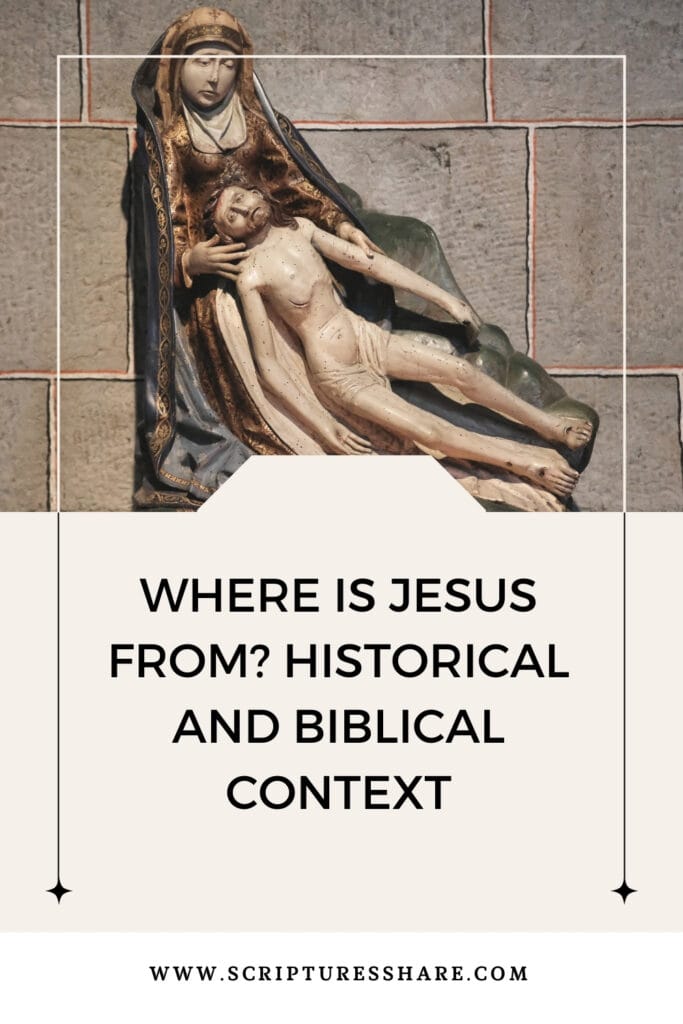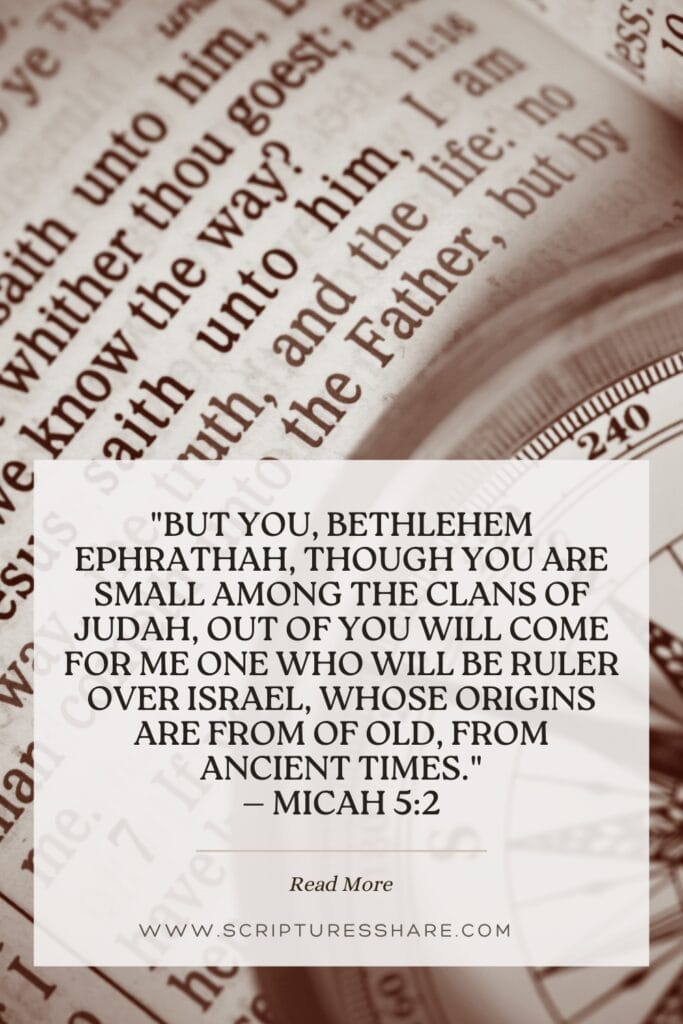No products in the cart.
Where Is Jesus From? Historical and Biblical Context
This post contains paid and/or affiliate links. I make a small commission at no extra cost to you. Please see our Privacy Policy.
The story of Jesus Christ’s birthplace and early life has sparked much debate: Where Is Jesus From? The Gospels tell us about his origins, but scholars keep looking into the details. They aim to understand where he came from.
This piece will look into the history and geography of Jesus’s birthplace. It will help us grasp the significance of this part of his story.
Historical Debate Surrounding Jesus’ Birthplace
For centuries, the place where Jesus was born has sparked debate. The Gospels offer different stories. Matthew and Luke say he was born in Bethlehem. But Mark and John don’t mention where he was born.
Scholars’ Perspectives on Nazareth and Bethlehem
Archaeologists have found evidence of an ancient village in Nazareth. This might mean Jesus lived there as a child. Yet, Bethlehem was also a real place back then. Scholars argue over which place was Jesus’s true birthplace.
Some think the different stories in the Gospels came from later theological debates, not historical facts. Others believe Jesus was born in Bethlehem but grew up in Nazareth. This could explain the differences.

| Perspective | Key Points |
|---|---|
| Nazareth as Birthplace |
|
| Bethlehem as Birthplace |
|
The debate over Jesus’s birthplace is ongoing. Scholars look at historical and biblical evidence to figure out the most likely spot. This shows how important Jesus’s life and origins are to many people.
Geographical Context: Galilee and Judea
To grasp Jesus’s life and ministry, we must look at the geography and history of Galilee and Judea. These areas in ancient Palestine had different cultures, politics, and beliefs. These differences likely influenced Jesus’s teachings and how people saw him.
Galilee was in northern Palestine and was mostly Jewish. It had influences from Judean, Phoenician, and Hellenistic cultures. Judea, in the south, was under Roman rule and followed strict Jewish traditions. These differences affected how people, like Jesus of Nazareth, were seen in the divided land.
Knowing about the geographical context of Judea and Galilee helps us understand Jesus’s life and teachings. The Gospels place Jesus’s teachings mainly in these two areas. This shows us the historical and cultural factors that shaped them.
The Gospel Accounts of Jesus’ Birth
The Gospels of Matthew and Luke tell us about Jesus’s birth, known as the Nativity. They give us a look at how the Messiah came into the world. This shows the historical and spiritual importance of this event.
The Gospel of Matthew talks about the Magi, or wise men, who came from the East to meet the newborn king. It also tells us about King Herod’s plan to kill the baby Jesus. This led the Holy Family to flee to Egypt for safety.
Luke’s Gospel tells us about Mary and Joseph’s trip to Bethlehem, where Jesus was born in a humble place. Angels also appeared to shepherds, telling them about the Savior’s birth.
Even though the Gospels share a similar story, they have some differences. These differences have sparked debates among scholars. Some think the differences show the stories are more about faith than facts. Others believe they give us real insights into Jesus’ birth.
“The Gospels offer a compelling and deeply meaningful account of the Nativity, inviting us to reflect on the profound mystery and significance of Jesus’ arrival into the world.”
Despite the debates, the Gospel accounts of Jesus‘ birth are a key part of Christian tradition. They inspire believers to celebrate the Nativity and the impact of the birth of Christ.

The Historical Figures Surrounding Jesus’ Birth
The Gospels of the Bible tell us about key historical figures at Jesus’s birth. These include his parents, Mary and Joseph. They were crucial in the events leading up to the Nativity. Scholars have studied their lives and families for centuries.
Mary, Joseph, and the Role of Genealogies
The Gospels of Matthew and Luke give us detailed genealogies of Jesus’s lineage. Mary and Joseph, Jesus’s earthly parents, were key in this story. Their backgrounds and family histories help us understand Jesus’s birth. Scholars and theologians have looked into this, giving us a glimpse into Jesus’s world.
- The Gospel of Matthew shows Jesus’s lineage through Joseph, linking him to the royal House of David.
- Luke’s Gospel gives a different genealogy, tracing Jesus’s line through Mary, also connecting him to the Davidic line.
- Scholars have studied these genealogies to learn about Jesus’s family’s social and political status. They also looked at the religious and cultural traditions they followed.
The roles of Mary and Joseph, and their genealogies, have sparked much debate and interpretation. This has given us insights into the historical context of Jesus’s birth.
Archaeological Evidence and Jesus’ Birthplace
The Gospels tell us about Jesus’s birth, but archaeology has also added to the debate. In Nazareth, digs have found signs of an old town that might be where Jesus grew up.
This supports the Bible’s story of his life there. In Bethlehem, archaeologists have also found proof of a town during Jesus’s time, backing up the Bible’s birth story.
But, we don’t have clear proof of exactly where Jesus was born. This has led to debates among scholars. Some say there’s not enough evidence to pinpoint Jesus’s birth spot. Others believe the evidence we have, though not solid proof, points to Bethlehem as Jesus’s birthplace.
| Location | Archaeological Findings | Significance for Jesus’ Birthplace |
|---|---|---|
| Nazareth | Excavations have uncovered evidence of an ancient settlement that may have been Jesus’s childhood home. | Lends credence to the biblical claims of Jesus’s upbringing in the region. |
| Bethlehem | Archaeological findings have corroborated the biblical accounts of a settlement there during the time of Jesus’s birth. | Supports the traditional identification of Bethlehem as the site of Jesus’s nativity. |
The debate is ongoing, but the evidence and history give us clues about Jesus’s life. Scholars, historians, and believers keep exploring the mysteries of Jesus’s birth. They are still searching for clear proof about where this important figure was born.

Non-Biblical Sources and References to Jesus
The Gospels and Pauline epistles are key sources for learning about Jesus. Yet, scholars look at non-biblical sources too. These sources confirm Jesus was real, but they don’t tell us much about his life or teachings.
Josephus, a Jewish historian, mentioned Jesus twice in his work. His brief accounts show Jesus was a real person who was executed by Pontius Pilate.
Tacitus, a Roman historian, also talked about Jesus. He linked Jesus to his death by Pilate. Tacitus wasn’t a Christian, but his words support the story of Jesus.
But, these non-biblical sources have limits. They barely mention Jesus and don’t give much information. This has led to debates about how reliable and what these sources mean.
| Source | Reference to Jesus | Context |
|---|---|---|
| Josephus | Twice referenced Jesus in his writings | Acknowledged the historical figure of Jesus and his execution by Pontius Pilate |
| Tacitus | Connected Jesus to his execution by Pontius Pilate | Provided an independent, non-Christian confirmation of the key events surrounding Jesus |
These non-biblical sources don’t give as much detail as the Gospels. But, they still add to our understanding of Jesus. They help scholars discuss Jesus’s historical impact.
Where Is Jesus From? Historical and Biblical Context
For centuries, scholars have debated where Jesus was from. The biblical accounts and historical facts often disagree. This leads to a deep dive into Jesus’ birthplace and his early life.
The Gospels say Bethlehem was where Jesus was born. They also mention Nazareth as his childhood home. This puts him in ancient Galilee and Judea. This setting helps us understand his life’s historical and biblical context.
Scholars keep studying both biblical and non-biblical sources to learn more about Jesus. They look into the lives of Virgin Mary and Joseph. They also examine genealogies to find clues about Jesus’ birthplace and his early years in the Middle East.
The Impact of Jesus’ Birthplace on Early Christianity
The debate over where Jesus was born has greatly affected early Christianity. The Gospels say he was born in Bethlehem, which fits with Jewish prophecies. This helped prove Jesus was the Messiah many were waiting for.
On the other hand, being from Nazareth, a lesser-known town, made some doubt Jesus at first. Scholars think this doubt played a part in how early Christians saw Jesus. They also look at how his place of birth and culture shaped the early Christian movement.
Here’s how Jesus’ birthplace impacted early Christianity:
- The Bethlehem link made it clear he was the Messiah, boosting his credibility and the Christian message.
- Being from Nazareth, though, led to doubt and resistance. Some wondered if anything good could come from there (John 1:46).
- These places played a big role in how Jesus’ teachings spread and were accepted in the early days of Christianity.
The argument over Jesus’ birthplace has deeply influenced early Christianity. It shaped how people saw and accepted Jesus and his teachings in the faith’s early years.

Modern Interpretations and Significance
The debate about Jesus’s birthplace has shaped how we see him today. Scholars look at the theological implications of where he was born. They see how it ties to his role as the Messiah and the Son of God.
Theological and Cultural Implications
The debate has also changed how we see Jesus in art and literature. It has made different groups try to claim or change his story. These modern interpretations are still being talked about a lot by scholars and the public.
Some think Jesus being born in Bethlehem shows he came for the common people, not just the rich. This idea has made a big impact on how Christians see him. It also shapes how artists show his birth.
| Theological Implications | Cultural Implications |
|---|---|
| Jesus’s identity as the Messiah and Son of God | Influence on artistic and literary depictions of Jesus |
| Significance of Jesus’s humble birthplace | Reinterpretation of Jesus’s legacy by religious and political groups |
“The debate over Jesus’s birthplace has continued to shape modern understandings of this historical figure, with far-reaching theological and cultural implications.”
The ongoing talk about Jesus’s origins keeps bringing up new ideas. These modern interpretations are still being looked at and debated. They matter a lot in both theology and culture.

Controversies and Ongoing Debates
Many scholars and the public have debated where Jesus was from and if he really existed. Most scholars believe Jesus was a real person. But, a few think he was just a myth. This debate has grown with the internet, bringing new theories and stories.
Even with these debates, most scholars agree Jesus was real. They just can’t agree on many details about his life. The debate over whether he was born in Nazareth or Bethlehem is ongoing. Scholars look at history and the Bible to learn more about Jesus.
The idea that Jesus was made up has been rejected by most experts. Yet, it’s still shared online and by some groups. This leads to debates about Jesus’ existence and the trustworthiness of the Bible.
Questions about Jesus’ beginnings keep coming up. The debates and controversies are likely to continue. Scholars and the public will keep looking at the evidence. They aim to understand one of the most important figures in history.
Conclusion
For centuries, people have wondered where Jesus was from. Scholars and the public have looked into this deeply. The Bible tells us a lot, but history and archaeology add more to our knowledge.
There are still debates about where Jesus was born and his early life. These debates affect how we see Jesus today, both in faith and culture.
Looking for the real Jesus is still a big topic for scholars. New findings keep making us rethink Jesus’s beginnings. The mix of Bible stories and archaeological discoveries keeps us interested in Jesus’s life and times.
Understanding where Jesus came from shows how complex his story is. Scholars, theologians, and everyone else keep exploring and debating Jesus’s origins. This search is far from over.
FAQ
What are the primary sources for information about Jesus’s life and teachings?
The main sources are the Gospels and the Pauline epistles.
Where was Jesus born according to the Gospels?
Matthew and Luke say Jesus was born in Bethlehem. Mark and John don’t mention it.
What was the cultural and political context of the regions of Galilee and Judea?
Galilee was a Jewish area in northern ancient Palestine. Judea was in the south, under Roman rule. These differences likely influenced Jesus’s teachings and actions.
What key historical figures are introduced in the Gospels’ accounts of Jesus’s birth?
The Gospels introduce Mary, Joseph, and give detailed family histories.
What non-biblical sources mention Jesus?
Josephus and Tacitus wrote about Jesus, confirming he existed.
How have the debates over Jesus’s birthplace shaped the development of early Christianity?
Bethlehem was seen as his birthplace, fitting Jewish prophecies. Nazareth, though, made some doubt Jesus’s claim as the Messiah.
What are some of the modern interpretations and implications of the debate over Jesus’s birthplace?
Scholars and theologians see deep meaning in Jesus’s birthplace. The debate has shaped art, literature, and how different groups view Jesus’s legacy.
What is the “Christ myth theory” and how does it relate to the debate over Jesus’s historicity?
The “Christ myth theory” says Jesus was just a myth. This idea has grown online, but most scholars believe Jesus was real.













